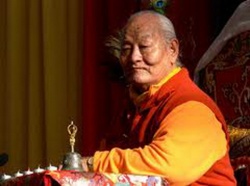Dvaya Sutta
Dvaya Sutta: A Pair
translated from the Pali by
Thanissaro Bhikkhu
"It's in dependence on a pair that consciousness comes into play. And how does consciousness come into play in dependence on a pair? In dependence on the eye & forms there arises eye-consciousness. The eye is inconstant, changeable, of a nature to become otherwise. Forms are inconstant, changeable, of a nature to become otherwise. Thus this pair is both wavering & fluctuating — inconstant, changeable, of a nature to become otherwise.
"Eye-consciousness is inconstant, changeable, of a nature to become otherwise. Whatever is the cause, the requisite condition, for the arising of eye-consciousness, that is inconstant, changeable, of a nature to become otherwise. Having arisen in dependence on an inconstant factor, how could eye-consciousness be constant?
"The coming together, the meeting, the convergence of these three phenomena is eye-contact. Whatever is the cause, the requisite condition, for the arising of eye-contact, that is inconstant, changeable, of a nature to become otherwise. Having arisen in dependence on an inconstant factor, how could eye-contact be constant?
"Contacted, one feels. Contacted, one intends. Contacted, one perceives. These phenomena are both wavering & fluctuating inconstant, changeable, of a nature to become otherwise. This is how it's in dependence on a pair that eye-consciousness comes into play.
"In dependence on the ear & sounds there arises ear-consciousness...
"In dependence on the nose & aromas there arises nose-consciousness...
"In dependence on the tongue & flavors there arises tongue-consciousness...
"In dependence on the body & tactile sensations there arises body-consciousness...
"In dependence on the intellect & ideas there arises intellect-consciousness. The intellect is inconstant, changeable, of a nature to become otherwise. Ideas are inconstant, changeable, of a nature to become otherwise. Thus this pair is both wavering & fluctuating inconstant, changeable, of a nature to become otherwise.
"Intellect-consciousness is inconstant, changeable, of a nature to become otherwise. Whatever is the cause, the requisite condition, for the arising of intellect-consciousness, that is inconstant, changeable, of a nature to become otherwise. Having arisen in dependence on an inconstant factor, how could intellect-consciousness be constant?
"The coming together, the meeting, the convergence of these three phenomena is intellect-contact. Whatever is the cause, the requisite condition, for the arising of intellect-contact, that is inconstant, changeable, of a nature to become otherwise. Having arisen in dependence on an inconstant factor, how could intellect-contact be constant?
"Contacted, one feels. Contacted, one intends. Contacted, one perceives. These phenomena are both wavering & fluctuating inconstant, changeable, of a nature to become otherwise. This is how it's in dependence on a pair that intellect-consciousness comes into play."

